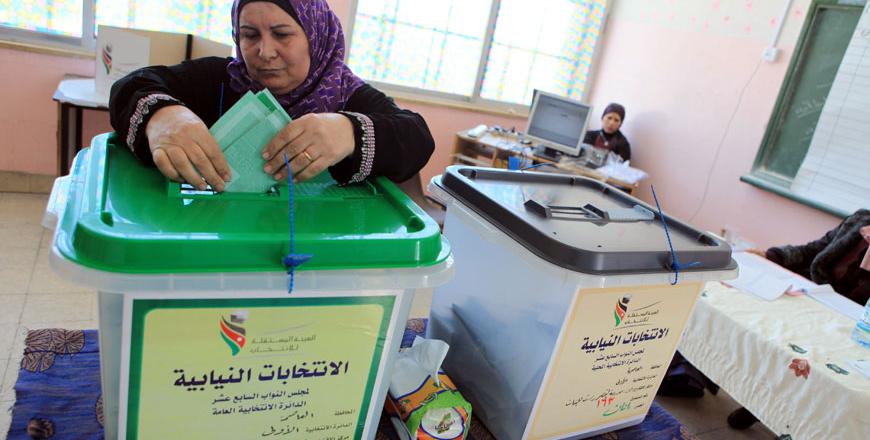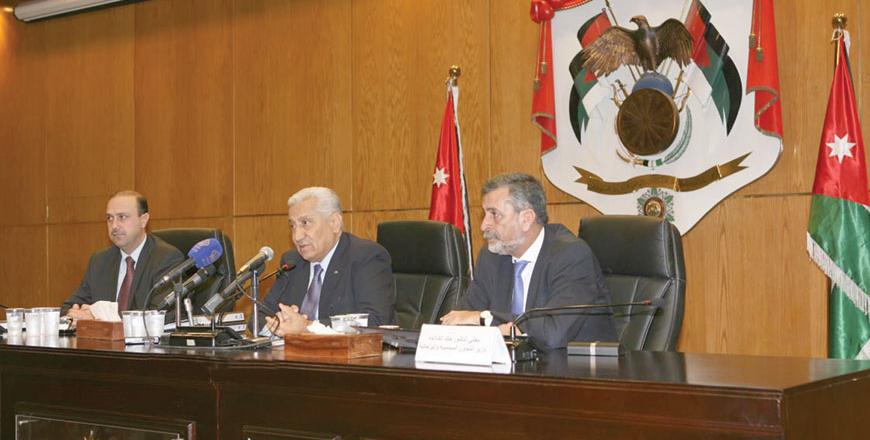You are here
Gov’t ‘satisfied’ over reactions to elections bill as political parties voice reservation
By Raed Omari , Petra - Sep 02,2015 - Last updated at Sep 02,2015

In this file photo, a woman casts her vote in the 2012 parliamentary polls. The government reports good public reaction to the proposed elections law (File photo)
AMMAN — At the time the government has expressed satisfaction over the "positive" reactions to the proposed parliamentary elections law, a group of political parties on Wednesday requested that the multi-member list proposed in the newly unveiled bill be "exclusively" formed by political parties.
In response to the politicians’ feedback, a senior government official said the demand contradicts the Constitution.
Heading a Cabinet meeting on Wednesday, Prime Minister Abdullah Ensour expressed relief over the "positive" and "welcoming" public reaction to the new elections law, saying that citizens' understanding and approval of the draft law is a major achievement in the reform process, the Jordan News Agency, Petra, reported.
Meanwhile, 20 political parties concluded a meeting they held Wednesday with a joint statement, casting doubt on the ability of the new elections law to bring to the Lower House "politicised" MPs capable of forming the envisioned parliamentary government.
They also stressed the importance of revisiting the elections bill so that the multi-member lists are only formed by political parties, citing its significance in bringing to the House lawmakers elected on the basis of platforms and genuine political thought.
Abolishing the decades-long one-person, one-vote system, the new law is based on the at-large voting system in which candidates can run for parliamentary elections via a multi-member ticket.
Under Article 9 of the 68-article law, eligible voters will have a number of votes equal to the number of seats allocated for their constituency. They will pick a ticket as a whole and then individuals from the same list.
Under the 2012 law, on the basis of which the 2013 parliamentary elections were held, each voter was given two votes: one for a candidate at the constituency level and another for a closed proportional list that competed for 27 seats at the national level.
Unveiling the law earlier this week, Ensour explained that the closed proportional list at the national level was removed from the new law as “it was ruled as unconstitutional by the Higher Council for the Interpretation of the Constitution”, which was later replaced by the Constitutional Court.
In remarks to The Jordan Times Wednesday, Political and Parliamentary Affairs Minister Khaled Kalaldeh described the 20 political parties’ position as “highly appreciated yet illogical”.
“In line with international standards”, Kalaldeh explained, the 2015 elections law was “carefully” designed according to demographic, geographic and development considerations so that all parts of the Kingdom can enjoy fair representation in the Parliament.
“Allocating half of the members of the Lower House to political parties is an unconstitutional demand,” Kalaldeh said, referring to another request by the 20 political parties which represented the rightist, leftist and centrist ideologies.
“Representation in the Lower House should be fair and reflect the actual development status of every district,” he said, adding: “How can underdeveloped regions be given the same representation or less representation than developed regions?”
“Political reform should be gradual in Jordan. Big political leaps are counterproductive,” he argued.
Asked if he expected the keystone piece of legislation would meet resistance from MPs, Kalaldeh said: “There is a positive atmosphere within the House regarding the draft law.”
In the government’s version of the law, the number of Lower House members was reduced to 130 from 150. Women’s quota of 15 seats remained the same.
Ensour said that the 2015 draft elections law, in its current version, is “more or less the same as the always-praised 1989 law,” a statement that has been challenged by critics, citing the fact that the 1989 elections did not include a mandatory vote for a ticket.
Reinstating the 1989 elections law has always been a pressing demand for many political parties, including the Muslim Brotherhood.
The proposed law received a positive initial reaction, including from the main opposition party, the Islamic Action Front, the political arm of the Brotherhood. However, the group issued a statement distancing itself from any comment by its members on the piece of legislation, saying that its official position would be announced later.
Related Articles
AMMAN — The government on Monday unveiled the new parliamentary elections law, removing from the keystone reform bill the longstanding one-p
AMMAN — A Royal Decree was issued on Monday adding the 2015 parliamentary elections bill and an amended version of the army officers’ servic
AMMAN — Women’s groups on Tuesday said they had hoped the 2015 draft elections law would have included a 20 per cent quota for women.On Mond












